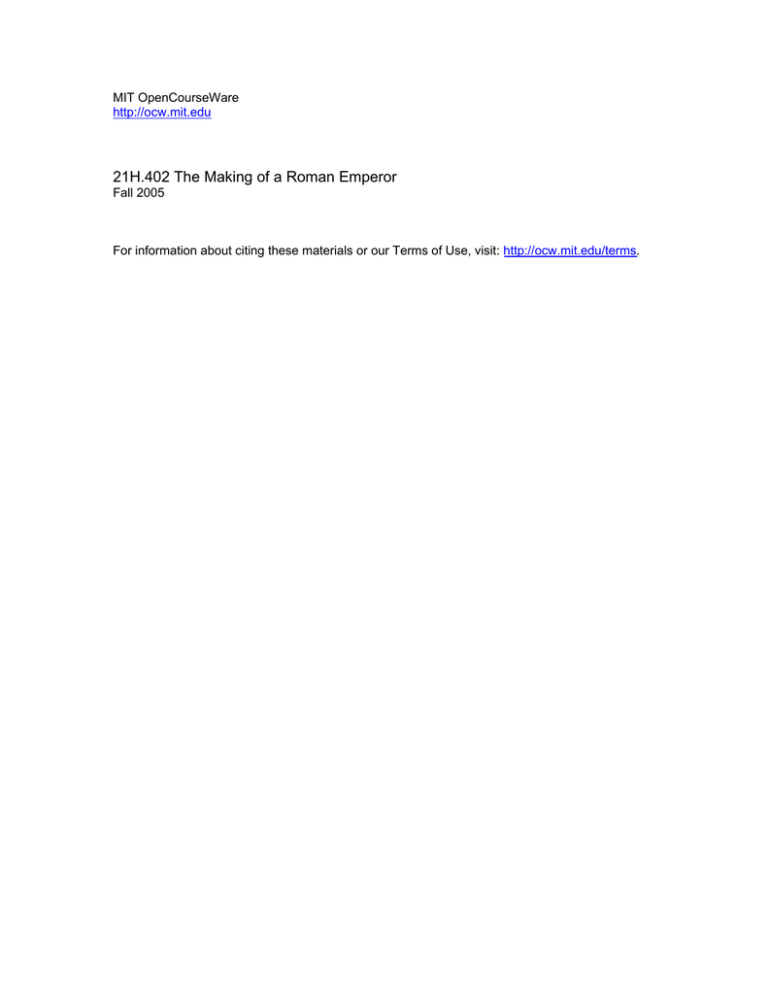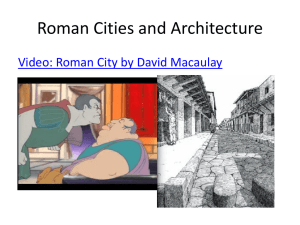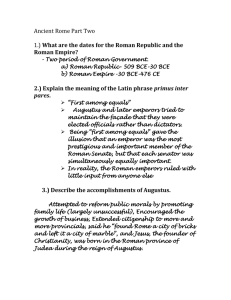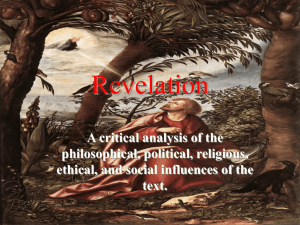21H.402 The Making of a Roman Emperor MIT OpenCourseWare Fall 2005
advertisement

MIT OpenCourseWare http://ocw.mit.edu 21H.402 The Making of a Roman Emperor Fall 2005 For information about citing these materials or our Terms of Use, visit: http://ocw.mit.edu/terms. 21H.402 THE MAKING OF A ROMAN EMPEROR Fall 2004 MW 11:30-1:00 Prof. Will Broadhead Focusing on the emperors Augustus and Nero, this course investigates the ways in which Roman emperors used art, architecture, coinage and other media to create and project an image of themselves, the ways in which the surviving literary sources from the Roman period reinforced or subverted that image, and the ways in which both phenomena have contributed to post-classical perceptions of Roman emperors. Material studied will include the art, architecture, and coinage of Augustan and Neronian Rome, the works of Suetonius and Tacitus, and modern representations of the emperors such as those found in I, Claudius and Quo Vadis. REQUIRED READING (available at MIT bookstore) • • • • Suetonius, The Lives of the Caesars, transl. C. Edwards (2001). Tacitus, The Annals of Imperial Rome, transl. M. Grant (1971). E. Champlin, Nero (2003). P. Zanker, The Power of Images in the Age of Augustus (1990). • Further reading available on the course web-site GRADING 25% Class Participation 20% Paper #1 (5 pages) 20% Paper #2 (5 pages) 35% Paper #3 (10 pages) CLASS PARTICIPATION The success of this course depends on the active participation of students in class meetings. The 25% of your overall grade coming from class participation will be based on the following: • Attendance at all class meetings • Completion of all reading assignments • Active participation in seminar discussion PAPERS Students will be required to write three papers for this course: Paper #1 – Due Monday, October 4 Five pages in length and worth 20%, this paper will take the form of a critical analysis of the accounts of Augustus and/or Nero in Tacitus and/or Suetonius. Precise topics will be distributed in due course. Paper #2 – Due Monday, November 1 Five pages in length and worth 20%, this paper will consist of a critical analysis of a monument of the Augustan Age, chosen from those discussed in Zanker, The Power of Images in the Age of Augustus. Precise topics will be agreed upon in due course. Paper #3 – Due Wednesday, December 8 Ten pages in length and worth 35%, this paper will consist of a widerranging analysis and will provide students the opportunity, and space, to bring together various aspects of the course in a longer work of synthesis. The grading of the final paper will be broken down as follows: 5% for a substantial outline of the paper, due Monday, November 22; 5% for a short presentation to the class, followed by a brief discussion, of your argument and the evidence on which it will rest (presentations will take place in Week 13); and the remaining 25% for the paper itself. PROVISIONAL SCHEDULE: DATE / TOPIC Week 1 W 9/8 Introduction: Studying Roman Emperors Week 2 M 9/13 The Emperors and their Empire W 9/15 Suetonius’ Augustus Week 3 M 9/20 Tacitus and Tacitus’ Augustus W 9/22 Tacitus’ Nero Week 4 M 9/27 Suetonius’ Nero W 9/29 Reading the Written Emperor Week 5 M 10/4 Warring images: Octavian, Antony, and Actium W 10/6 Inventing Augustus Week 6 M 10/11 HOLIDAY – COLUMBUS DAY W 10/13 Shaping Roman Values Week 7 M 10/18 Golden Prosperity W 10/20 Making Augustan History READING (items marked*available on course website) None • OCD3, ‘Rome (history)’, ‘senate’, ‘praetorians’, ‘Augustus’, ‘Nero’ * • Zanker, pp. 1-31 • Suetonius, Augustus, pp. 43-97 • OCD3, ‘Suetonius’ * • Tacitus, Annals, 1.1-15, 12.1-13.58 (pp. 31-42, 252-312) • OCD3, ‘Tacitus’ * • Tacitus, Annals 14.1-16.35 (pp. 312-397) • • • • Suetonius, Nero, pp. 195-227 Champlin, pp. 36-52 Barton, ‘The inventio of Nero’ * Syme on Tacitus * • Zanker, pp. 33-77 First Paper Due • Zanker, pp. 78-100 • Res Gestae * • Zanker, pp. 101-166 • Zanker, pp. 167-192 • Virgil, Aeneid excerpts * • Zanker, pp. 192-238 Week 8 M 10/25 Nero makes a spectacle of himself W 10/27 Neronian Myth-making Week 9 M 11/1 Nero Behaving Badly W 11/3 Nero’s Rome Week 10 M 11/8 Making a Military Mockery W 11/10 Making Imperial History Week 11 M 11/15 The Reel Nero: Quo Vadis? (1951) W 11/17 Nero’s Christian Afterlife Week 12 M 11/22 Mussolini’s Augustus W 11/24 Syme’s Augustus Week 13 M 11/29 Presentation and Discussion of Final Paper Topics W 12/1 Presentation and Discussion of Final Paper Topics Week 14 M 12/6 I, Claudius W 12/8 Conclusion: whose emperors? • Champlin, pp. 53-83 • Champlin, pp. 84-144 • Champlin, pp. 145-177 Second Paper Due • Champlin, pp. 178-209 • Champlin, pp. 210-234 • Jenkins, Re-thinking History * • Evans, In Defence of History * • M. Wyke, Projecting the Past, pp. 110-146 * • Champlin, pp. 1-35 • Raaflaub and Toher, ‘Editors’ preface’ to BRAM, xi-xxi • Scott, ‘Mussolini and the Roman Empire’ * • Aicher, ‘Mussolini’s Forum’ * Outline of Final Paper Due • Syme, The Roman Revolution, excerpts * • Galsterer, ‘A Man, a Book, and a Method’ * Reading for Final Paper Reading for Final Paper • S. Joshel, ‘I, Claudius: Projection and Imperial Soap Opera’ * Final Paper Due


